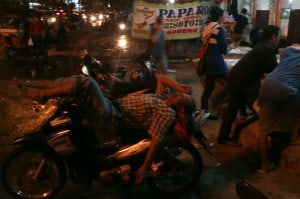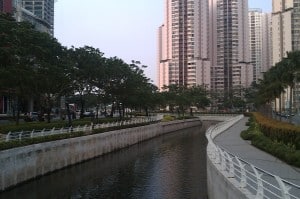I was in Indonesia for one month. Mostly in Jakarta, but the last week I spent on the paradise island of Bali. Indonesia is a fascinating country with a lot of potential to grow and develop. Here are my insights on my experience.
The people
The people of Jakarta (capital city of Indonesia) have some similarities with Estonians – they are not very pushy and talkative with strangers, outside of their families they are mostly very individualistic, and they are extremely money-oriented. They have some weird moral boundaries – for example, stealing is considered very bad and it is quite rare. On the other hand the cashiers in shops and the taxi drivers tend to always give you back less money than they are supposed to. It seems that they don’t see it as stealing, because it is so widely spread. If you specifically ask back the exact amount, they usually say that they don’t have the small bills (although they do). Some journalists have calculated that they actually earn a significant amount of extra money by taking small amounts from almost every customer.
My biggest culture shock
I’m living in a small villa where I share the bathroom and the kitchen. In the same villa lives my Estonian friend Aivar with whom we also share some food. One day I was cooking and planning to use the eggs that Aivar had bought for both of us, but I wasn’t exactly sure where he had put them. As I couldn’t get in touch with him I assumed that his eggs are in the fridge and took three eggs from there. I figured that even if those specific eggs are not ours, I can later relocate Aivar’s ones from another shelf. Aivar also forgot to call me back and I soon had to leave the house for a meeting.

A few hours later when I met my friends I heard that I had created a huge panic – the owner of the villa called Dessy (Lauri’s girlfriend and my local contact person for them) and quite emotionally told that Erik is stealing from the other guests. It even seemed that I might get kicked out from the house. Instead, later in the evening I got a very long SMS reminding me many of the house rules, including: „It is forbidden to bring the non-muslim food like pork in the house”. Nothing about stealing though.
It later came out that Aivar’s eggs were in his room, so we replaced the three eggs with six eggs and actually as I was never going to cook in the kitchen again, there are probably still all of the ten eggs left that we had. I also think that the owner of the three eggs didn’t even know that he/she had three eggs missing as everything happened so fast – the maid discovered my „crime“ and contacted the owner, she contacted Dessy and some hours later when we got back, we immediately replaced the eggs in the fridge.
This story reminds me of AIESEC times when there were constantly conflicts with Estonians living with Colombians (or other South-Americans) – the latter are obviously very social and share everything with the people they are living and expect the same from others. Estonians on the other hand were not very happy to share their stuff and were always complaining if a roommate used their food, towel or even bed sheets. So you could imagine that Indonesians are like Estonians in this context, just that they are even 10 times more individualistic than Estonians.
Corruption

Indonesians are also extremely corrupt – if there are any options to be corrupt in their work place, they will probably be. In my opinion it is the worst thing any country can have – corruption is the number one obstacle for development of the country as a whole.
The entire police system here seems totally pointless – if you want to be a police officer, you actually have to pay to have the job instead of them paying you the salary. And the job is very popular, as even without any salary and the fact that you have to pay the employer, they still earn tons of money from the bribes they get from the street. The whole system is built on the bribes. As an example – when driving through one part of Bali, we were stopped by the police twice. First time there was a reason – we missed a red light. At first the police asked 500 000 rupiah (~50$ USD) but we managed to negotiate it to 100 000 rupiah (~10$). The second time we were stopped just because we were white – we showed the EU driving licence, but they didn’t like it and asked for a bribe. As we had just payed 100 000 to another policeman, we were not in the mood of paying any more. And as they have no point in taking us to the police station (there they wouldn’t get money at all) they finally let us go without any bribe. Of course Lauri’s local language skills helped a lot.
I think Indonesians have thoroughly misunderstood the idea of the Police in the society somewhere during the development of the country. One day we also noticed an article in the local newspaper about a group rape in a rural area of Indonesia – a 16 year old girl was raped by 12 people in a period of 2-3 months. 9 out of 12 rapers were police officials.
The language
Bahasa Indonesia (Indonesian language) seems quite simple – I’m planning to learn it. The biggest surprise for me in Indonesia was to see how bad Indonesians are with English. Even in Cambodia they understood more English than they do in here (not to talk about Kenya – in Kenya people from kids to older generation all spoke good English).
On one hand it is complicated to handle by yourself without the local language skills, on the other hand there is a huge motivation to learn the language as fast as possible, and it is also easier to learn if everyone only speaks the local language with you.
The island of Bali
Most of the tourists don’t even know that Bali is a part of Indonesia and they actually might have a logic behind it – Bali is like a totally different world compared to Jakarta. Most importantly – the religion is different. While most of Indonesians are Muslims, Bali people are mostly Hindus. Instead of noisy mosques, there are small mystical temples everywhere. And instead of CO2 emissions and gases, the streets smell of nice incense coming from gardens and temples. People are calmer, friendly, easy-going, even happier.
There are also more internationals on the island – it is a very popular tourist destination, particularly for Australians. That has brought better overall English skills to the region.
Bali truly is a modern paradise – it has huge sandy beaches with almost perfect waves for surfers. In the evening there are huge parties in the city center. The biggest and the most famous party street – Jalan Legian – becomes like one huge party itself with the bars reaching out on the streets, music in every corner, exotic dancers on the bars, streets, tables, even rooftops. There is something for everyone – foam party in one club, local rock band playing AC/DC in a pub, dancers and striptease in another, parade music and dance festival in the third. And this happens every day without exceptions.
Me and Lauri managed to get a hotel on a street that later turned out to be the party street for all kind of unconventional people like transvestites, gays, lesbians, ladyboys and all kind of weirdos that don’t even have a term of their own. But it was funny and the hotel was very good. We also rented a scooter for the whole week for 50 000 rupiah (~5 $) per day – that enabled us to move around a lot and go wherever we wanted.
I would love to build our development office in Bali – it is a great place to work and live for IT-teams. We visited a place called Startup Getaway that offers entrepreneurs and startups a great place to work and live. Their aim is to handle all of the food, cleaning, laundry and other maintenance issues so that people working in their villas could just concentrate on the work and personal life. It is also a great community of open-minded people who help and support each other in different fields of business. I think working in Bali would be a great experience for IT-teams – they can truly concentrate on their work during the work time and then relax and enjoy the life in a paradise when not working.
And there actually are quite many western companies in Bali, so you can even do some business without leaving the island.
Conclusion

In my last two blog posts about Indonesia I have brought out the main positive and negative impressions I got from my trip to Indonesia. To wrap it up, I have to say, I enjoyed the experience a lot and I really like the country. It is a nice developing country with a lot of different faces. I am curious to learn more about it and get to know better all of the different sides of the country. I definitely want to continue to work with and in Indonesia.







